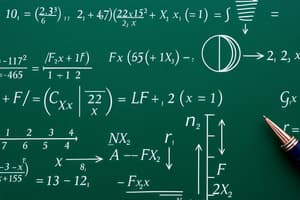Podcast
Questions and Answers
Which branch of mathematics primarily deals with shapes, sizes, and the properties of space?
Which branch of mathematics primarily deals with shapes, sizes, and the properties of space?
- Statistics
- Calculus
- Geometry (correct)
- Algebra
What is the study of change and motion in mathematics primarily called?
What is the study of change and motion in mathematics primarily called?
- Statistics
- Algebra
- Calculus (correct)
- Geometry
Which concept in mathematics describes the relationship between sets where each input has exactly one output?
Which concept in mathematics describes the relationship between sets where each input has exactly one output?
- Function (correct)
- Graph
- Matrix
- Set Theory
Which key concept is NOT typically associated with statistics?
Which key concept is NOT typically associated with statistics?
Who is recognized as the 'Father of Geometry'?
Who is recognized as the 'Father of Geometry'?
Which of the following branches focuses on symbols and the rules for manipulating them?
Which of the following branches focuses on symbols and the rules for manipulating them?
What type of geometry includes the study of surfaces and solids?
What type of geometry includes the study of surfaces and solids?
Which mathematical principle relates to the logical argument demonstrating the truth of a statement?
Which mathematical principle relates to the logical argument demonstrating the truth of a statement?
Flashcards are hidden until you start studying
Study Notes
Overview of Mathematics
- Mathematics is the abstract science of number, quantity, and space.
- It encompasses various branches like arithmetic, algebra, geometry, calculus, and statistics.
Key Branches of Mathematics
-
Arithmetic
- Study of numbers and basic operations: addition, subtraction, multiplication, and division.
- Fundamental concepts: whole numbers, integers, fractions, decimals.
-
Algebra
- Focuses on symbols and the rules for manipulating those symbols.
- Key concepts include variables, equations, and functions.
- Types: linear algebra, abstract algebra.
-
Geometry
- Study of shapes, sizes, and properties of space.
- Key concepts: points, lines, angles, surfaces, and solids.
- Types: Euclidean, non-Euclidean geometry.
-
Calculus
- Study of change and motion, through derivatives and integrals.
- Fundamental concepts: limits, continuity, differentiation, and integration.
- Applications in physics, engineering, and economics.
-
Statistics
- Collection, analysis, interpretation, and presentation of data.
- Key concepts: mean, median, mode, standard deviation, probability distributions.
Mathematical Principles
- Number Theory: Study of integers and their properties.
- Logic: Foundation of mathematical reasoning and proof.
- Set Theory: Study of sets, or collections of objects.
- Mathematical Proof: A logical argument demonstrating the truth of a statement.
Applications of Mathematics
- Used in various fields including science, engineering, economics, social sciences, and medicine.
- Essential for problem-solving and critical thinking skills.
Important Mathematicians
- Euclid: Known as the "Father of Geometry."
- Isaac Newton: Co-developed calculus.
- Carl Friedrich Gauss: Made significant contributions to number theory and statistics.
Mathematical Concepts
- Functions: Relationship between sets that assigns each input exactly one output.
- Graphs: Visual representations of relationships between variables.
- Matrices: Rectangular arrays of numbers used in algebra and calculus.
Study Tips
- Practice problems regularly to reinforce concepts.
- Use visual aids such as graphs and diagrams for understanding.
- Collaborate with others to discuss and solve mathematical challenges.
Overview of Mathematics
- Abstract science focused on number, quantity, and space.
- Includes branches such as arithmetic, algebra, geometry, calculus, and statistics.
Key Branches of Mathematics
-
Arithmetic
- Involves basic operations: addition, subtraction, multiplication, and division.
- Key concepts encompass whole numbers, integers, fractions, and decimals.
-
Algebra
- Centers on symbols and their manipulation using established rules.
- Introduces variables, equations, and functions; includes linear and abstract algebra.
-
Geometry
- Explores shapes, sizes, and properties of space and figures.
- Involves fundamental concepts like points, lines, angles, surfaces, and solids; classified into Euclidean and non-Euclidean geometry.
-
Calculus
- Studies change and motion through concepts of derivatives and integrals.
- Fundamental principles include limits, continuity, differentiation, and integration; widely applied in physics, engineering, and economics.
-
Statistics
- Entails the collection, analysis, interpretation, and presentation of data.
- Key concepts include mean, median, mode, standard deviation, and probability distributions.
Mathematical Principles
- Number Theory: Investigates properties and relationships of integers.
- Logic: Forms the basis of mathematical reasoning and proof.
- Set Theory: Examines sets as collections of objects.
- Mathematical Proof: Provides logical arguments that confirm the truth of statements.
Applications of Mathematics
- Employed across diverse fields: science, engineering, economics, social sciences, and medicine.
- Vital for developing problem-solving and critical-thinking abilities.
Important Mathematicians
- Euclid: Recognized as the "Father of Geometry" for foundational contributions.
- Isaac Newton: Co-developed calculus, significantly impacting mathematics and physics.
- Carl Friedrich Gauss: Renowned for considerable advancements in number theory and statistics.
Mathematical Concepts
- Functions: Define relationships between sets, assigning each input one output.
- Graphs: Serve as visual tools to represent relationships between variables.
- Matrices: Arrangements of numbers aiding in algebraic and calculus operations.
Study Tips
- Regular practice of problems is crucial to reinforce mathematical concepts.
- Utilize visual aids (graphs and diagrams) for enhanced understanding.
- Form study groups for collaboration and tackling challenging problems.
Studying That Suits You
Use AI to generate personalized quizzes and flashcards to suit your learning preferences.




